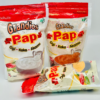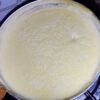Ogi (Akamu or Koko Pap) is a popular fermented cornmeal porridge in West Africa, especially in Nigeria and Ghana.
Preparation
- Cornmeal soaking: Cornmeal is soaked in water to soften it.
- Fermentation: The soaked cornmeal is fermented to break down the starches and create lactic acid.
- Grinding: The fermented cornmeal is ground into a fine paste.
- Cooking: The paste is cooked with water to create a thick, creamy porridge.
Health Benefits
- Rich in probiotics: Ogi contains probiotics from the fermentation process, supporting gut health.
- High in fiber: Ogi is a good source of dietary fiber, promoting digestive health.
- Good source of vitamins and minerals: Ogi is a good source of vitamins B and E, as well as minerals like potassium and iron.
Cultural Significance
- Traditional breakfast: Ogi is a traditional breakfast food in many West African cultures.
- Special occasions: Ogi is often served at special occasions like weddings and festivals.
- Comfort food: Ogi is considered a comfort food, providing warmth and nourishment.
Variations
- Nigerian Ogi: Nigerian Ogi is made with cornmeal and has a thicker consistency.
- Ghanaian Koko: Ghanaian Koko is made with millet or cornmeal and has a thinner consistency.
- Add-ins: Various add-ins like sugar, honey, or fruit can be added to Ogi for flavor and nutrition.







Reviews
There are no reviews yet.